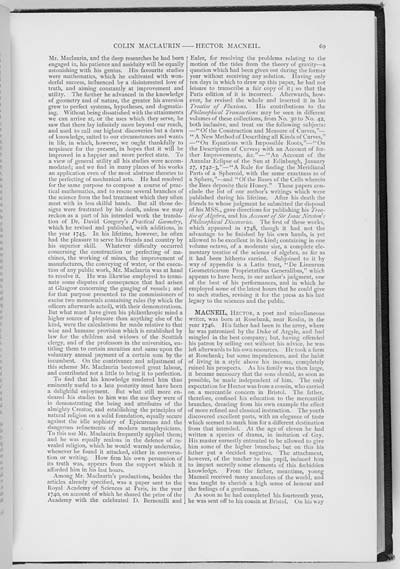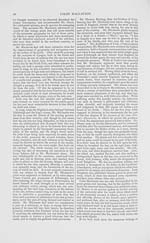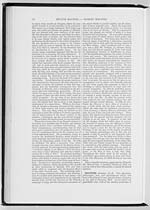69
Mr. Maclaurin, and the deep researches he had been
engaged in, his patience and assiduity will be equally
astonishing with his genius. His favourite studies
were mathematics, which he cultivated with won-
derful success, influenced by a disinterested love of
truth, and aiming constantly at improvement and
utility. The further he advanced in the knowledge
of geometry and of nature, the greater his aversion
grew to perfect systems, hypotheses, and dogmatiz-
ing. Without being dissatisfied with the attainments
we can arrive at, or the uses which they serve, he
saw that there lay infinitely more beyond our reach,
and used to call our highest discoveries but a dawn
of knowledge, suited to our circumstances and wants
in life, in which, however, we ought thankfully to
acquiesce for the present, in hopes that it will be
improved in a happier and more perfect state. To
a view of general utility all his studies were accom-
modated; and we find in many places of his works
an application even of the most abstruse theories to
the perfecting of mechanical arts. He had resolved
for the same purpose to compose a course of prac-
tical mathematics, and to rescue several branches of
the science from the bad treatment which they often
meet with in less skilful hands. But all those de-
signs were frustrated by his death, unless we may
reckon as a part of his intended work the transla-
tion of Dr. David Gregory's Practical Geometry,
which he revised and published, with additions, in
the year 1745. In his lifetime, however, he often
had the pleasure to serve his friends and country by
his superior skill. Whatever difficulty occurred
concerning the construction or perfecting of ma-
chines, the working of mines, the improvement of
manufactures, the conveying of water, or the execu-
tion of any public work, Mr. Maclaurin was at hand
to resolve it. He was likewise employed to termi-
nate some disputes of consequence that had arisen
at Glasgow concerning the gauging of vessels; and
for that purpose presented to the commissioners of
excise two memorials containing rules (by which the
officers afterwards acted), with their demonstrations.
But what must have given his philanthropic mind a
higher source of pleasure than anything else of the
kind, were the calculations he made relative to that
wise and humane provision which is established by
law for the children and widows of the Scottish
clergy, and of the professors in the universities, en-
titling them to certain annuities and sums upon the
voluntary annual payment of a certain sum by the
incumbent. On the contrivance and adjustment of
this scheme Mr. Maclaurin bestowed great labour,
and contributed not a little to bring it to perfection.
To find that his knowledge rendered him thus
eminently useful to a late posterity must have been
a delightful enjoyment. But what still more en-
deared his studies to him was the use they were of
in demonstrating the being and attributes of the
almighty Creator, and establishing the principles of
natural religion on a solid foundation, equally secure
against the idle sophistry of Epicureans and the
dangerous refinements of modern metaphysicians.
To this use Mr. Maclaurin frequently applied them;
and he was equally zealous in the defence of re-
vealed religion, which he would warmly undertake,
whenever he found it attacked, either in conversa-
tion or writing. How firm his own persuasion of
its truth was, appears from the support which it
afforded him in his last hours.
Among Mr. Maclaurin's productions, besides the
articles already specified, was a paper sent to the
Royal Academy of Sciences at Paris, in the year
1740, on account of which he shared the prize of the
Academy with the celebrated D. Bernouilli and
Euler, for resolving the problems relating to the
motion of the tides from the theory of gravity�a
question which had been given out during the former
year without receiving any solution. Having only
ten days in which to draw up this paper, he had not
leisure to transcribe a fair copy of it; so that the
Paris edition of it is incorrect. Afterwards, how-
ever, he revised the whole and inserted it in his
Treatise of Fluxions. His contributions to the
Philosophical Transactions may be seen in different
volumes of these collections, from No. 30 to No. 42,
both inclusive, and treat on the following subjects:
�"Of the Construction and Measure of Curves,"�
'' A New Method of Describing all Kinds of Curves,"
�"On Equations with Impossible Roots,"�"On
the Description of Curves; with an Account of fur-
ther Improvements, &c." � "An Account of the
Annular Eclipse of the Sun at Edinburgh, January
27, 1742-3,"�"A Rule for finding the Meridianal
Parts of a Spheroid, with the same exactness as of
a Sphere,"�and "Of the Bases of the Cells wherein
the Bees deposite their Honey." These papers con-
clude the list of our author's writings which were
published during his lifetime. After his death the
friends to whose judgment he submitted the disposal
of his MSS., gave directions for publishing his Trea-
tise of Algebra, and his Account of Sir Isaac Newton's
Philosophical Discoveries. The first of these works,
which appeared in 1748, though it had not the
advantage to be finished by his own hands, is yet
allowed to be excellent in its kind; containing in one
volume octavo, of a moderate size, a complete ele-
mentary treatise of the science of algebra, as far as
it had been hitherto carried. Subjoined to it by
way of appendix is a Latin tract, "De Linearum
Geometricarum Proprietatibus Generalibus," which
appears to have been, in our author's judgment, one
of the best of his performances, and in which he
employed some of the latest hours that he could give
to such studies, revising it for the press as his last
legacy to the sciences and the public.
MACNEIL, HECTOR, a poet and miscellaneous
writer, was born at Rosebank, near Roslin, in the
year 1746. His father had been in the army, where
he was patronized by the Duke of Argyle, and had
mingled in the best company; but, having offended
his patron by selling out without his advice, he was
left afterwards to his own resources. He took a farm
at Rosebank; but some imprudences, and the habit
of living in a style above his income, completely
ruined his prospects. As his family was then large,
it became necessary that the sons should, as soon as
possible, be made independent of him. The only
expectation for Hector was from a cousin, who carried
on a mercantile concern in Bristol. The father,
therefore, confined his education to the mercantile
branches, dreading from his own example the effect
of more refined and classical instruction. The youth
discovered excellent parts, with an elegance of taste
which seemed to mark him for a different destination
from that intended. At the age of eleven he had
written a species of drama, in imitation of Gay.
His master earnestly entreated to be allowed to give
him some of the higher branches; but on this his
father put a decided negative. The attachment,
however, of the teacher to his pupil, induced him
to impart secretly some elements of this forbidden
knowledge. From the father, meantime, young
Macneil received many anecdotes of the world, and
was taught to cherish a high sense of honour and
the feelings of a gentleman.
As soon as he had completed his fourteenth year,
he was sent off to his cousin at Bristol. On his way

![]() Universal Viewer |
Universal Viewer | ![]() Mirador |
Large image | Transcription
Mirador |
Large image | Transcription
![]()

